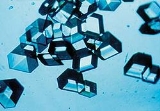
Biotechnology
Overview
Biotechnology is a field of applied biology
that involves the use of living organisms and bioprocesses in engineering
, technology
, medicine
and other fields requiring bioproducts. Biotechnology also utilizes these products for manufacturing purpose. Modern use of similar terms includes genetic engineering
as well as cell-
and tissue culture
technologies. The concept encompasses a wide range of procedures (and history
) for modifying living organisms according to human purposes — going back to domestication of animals, cultivation of plants, and "improvements" to these through breeding programs that employ artificial selection
and hybridization.
Biology
Biology is a natural science concerned with the study of life and living organisms, including their structure, function, growth, origin, evolution, distribution, and taxonomy. Biology is a vast subject containing many subdivisions, topics, and disciplines...
that involves the use of living organisms and bioprocesses in engineering
Engineering
Engineering is the discipline, art, skill and profession of acquiring and applying scientific, mathematical, economic, social, and practical knowledge, in order to design and build structures, machines, devices, systems, materials and processes that safely realize improvements to the lives of...
, technology
Technology
Technology is the making, usage, and knowledge of tools, machines, techniques, crafts, systems or methods of organization in order to solve a problem or perform a specific function. It can also refer to the collection of such tools, machinery, and procedures. The word technology comes ;...
, medicine
Medicine
Medicine is the science and art of healing. It encompasses a variety of health care practices evolved to maintain and restore health by the prevention and treatment of illness....
and other fields requiring bioproducts. Biotechnology also utilizes these products for manufacturing purpose. Modern use of similar terms includes genetic engineering
Genetic engineering
Genetic engineering, also called genetic modification, is the direct human manipulation of an organism's genome using modern DNA technology. It involves the introduction of foreign DNA or synthetic genes into the organism of interest...
as well as cell-
Cell culture
Cell culture is the complex process by which cells are grown under controlled conditions. In practice, the term "cell culture" has come to refer to the culturing of cells derived from singlecellular eukaryotes, especially animal cells. However, there are also cultures of plants, fungi and microbes,...
and tissue culture
Tissue culture
Tissue culture is the growth of tissues or cells separate from the organism. This is typically facilitated via use of a liquid, semi-solid, or solid growth medium, such as broth or agar...
technologies. The concept encompasses a wide range of procedures (and history
History
History is the discovery, collection, organization, and presentation of information about past events. History can also mean the period of time after writing was invented. Scholars who write about history are called historians...
) for modifying living organisms according to human purposes — going back to domestication of animals, cultivation of plants, and "improvements" to these through breeding programs that employ artificial selection
Artificial selection
Artificial selection describes intentional breeding for certain traits, or combination of traits. The term was utilized by Charles Darwin in contrast to natural selection, in which the differential reproduction of organisms with certain traits is attributed to improved survival or reproductive...
and hybridization.
Unanswered Questions

